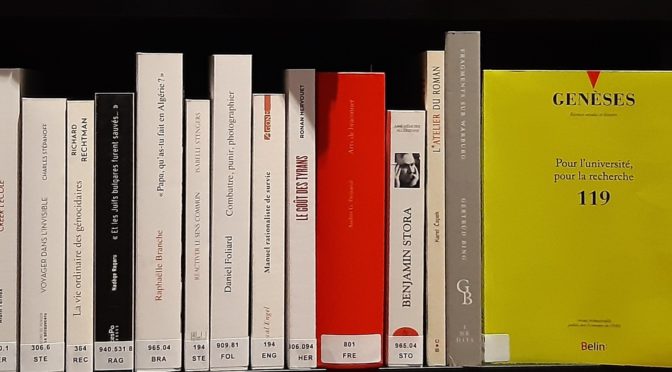
Konec akademického roku oslavíme prezentací francouzských knižních novinek v humanitních a společenských vědách.
Sejdeme se ve čtvrtek 17. června 2021 v 16:30 on-line (odkaz brzo publikován)
Mimo jiné budou představeny následující knihy:
- Henri Bergeron, Olivier Borraz, Patrick Castel, François Dedieu : Covid-19 : Une crise organisationnelle (Les Presses de Sciences Po 2020) představí Hugo Plassais
- Gertrud Bing : Fragments sur Aby Warburg (Institut national d’histoire de l’art, 2020) představí Lara Bonneau
- Noémie Etienne : Les autres et les ancêtres. Les dioramas de Franz Boas et d’Arthur C. Parker à New York, 1900 (Les presses du réel, 2020) představí Fedora Parkmann
- Jacques Rancière : Le temps du paysage : Aux origines de la révolution esthétique (La Fabrique 2020) představí Marie Blanc
- Anne-Marie Thiesse : La Fabrique de l’écrivain national. Entre littérature et politique (Gallimard, 2019) představí Michael Wögerbauer
- Enzo Traverso : Passés singuliers. Le “je” dans l’écriture de l’histoire (LUX, 2020) představí Arthur Pérodeau
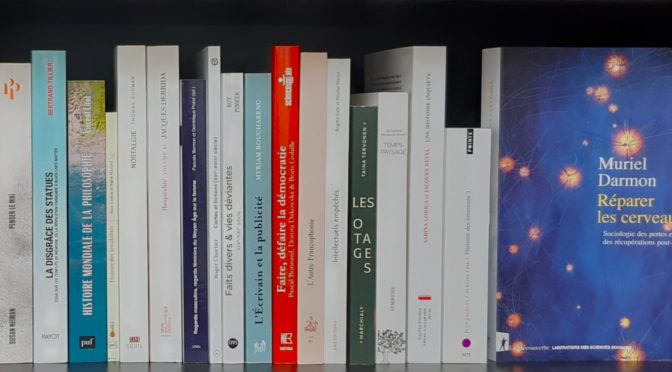
Konec roku oslavíme prezentací francouzských knižních novinek v humanitních a společenských vědách. Sejdeme se
v úterý 27. června 2023 v 15 hodin
v knihovně CEFRES (Na Florenci 3, Praha 1).
Na tomto přátelském setkání se sejde tým CEFRES a čtenáři knihovny, aby se společně seznamili a diskutovali o novinkách v humanitních a společenských vědách ve Francii. Každá prezentace (ve francouzštině) nepřesahuje rozsah 10 minut, a po ní následuje krátká diskuse.
Představeny budou následující knihy: Pokračování textu Prezentace nových přirůstek knihovny CEFRES – červen 2023 →
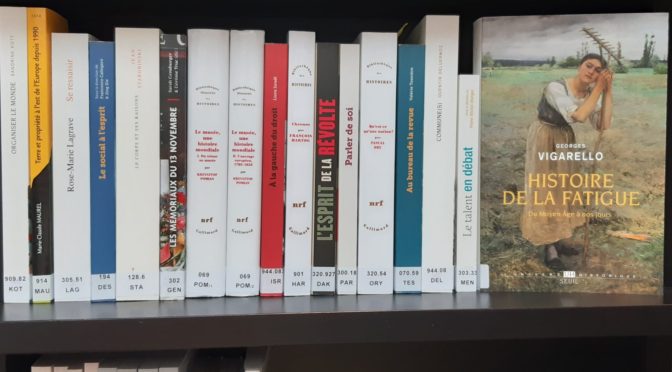
Konec roku oslavíme prezentací francouzských knižních novinek v humanitních a společenských vědách.
Sejdeme se v pátek 10. prosince 2021 v 15:00 on-line (na platformě zoom viz ID 895 7040 0457)
Mimo jiné budou představeny následující knihy:
- Marie-Madeleine de Cevins : Démystifier l’Europe centrale : Bohême, Hongrie et Pologne. VIIe-XVIe siècles (Passés Composés 2021) představí Arthur Pérodeau
- Leyla Dakhli (& al.) : L’esprit de la révolte. Archives et actualité des révolutions arabes (Seuil, 2020) představí Clément Steuer
- Rose-Marie Lagrave : Se ressaisir. Enquête autobiographique d’une transfuge de classe féministe (La Découverte 2021) představí Jérôme Heurtaux
- Karol Modzelewski : Nous avons fait galoper l’histoire. Confession d’un cavalier fatigué (Maison des sciences de l’homme, 2018) představí Florence Baudoux Vychytil
- Pascal Ory : Qu’est-ce qu’une nation ? Une histoire mondiale (Gallimard 2020) představí Mátyás Erdélyi

Konec roku oslavíme prezentací francouzských knižních novinek v humanitních a společenských vědách.
Sejdeme se v pátek 16. prosince 2022 v 14:30 on-line (na platformě zoom viz ID 896 9016 5381)
Mimo jiné budou představeny následující knihy:
- Emmanuel Alcaraz : Histoire de l’Algérie et de ses mémoires (Karthala 2021) představí Clément Steuer
- Anna Colin Lebedev : Jamais frères ? : Ukraine et Russie : une tragédie postsoviétique (Seuil 2022) představí Ronan Hervouet
- Magali Della-Suda : Les nouvelles femmes de droite (Hors d’atteinte 2022) představí Adrien Beauduin
- Virginie Despentes : King-Kong théorie (Livre de poche, 2007) představí Michaela Rumpíková
- Charles Stepanoff : L’Animal et la mort (La Découverte 2021) představí Hana Fořtová
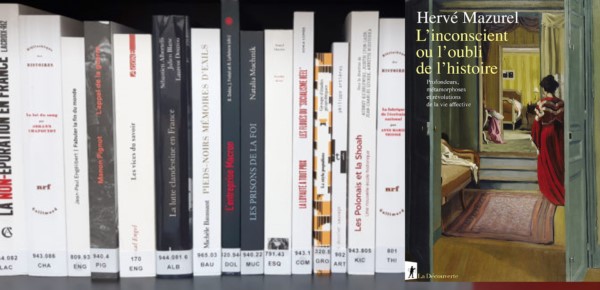
Konec roku oslavíme prezentací francouzských knižních novinek v humanitních a společenských vědách.
Sejdeme se v pondělí 18. prosince 2023 v 16:30 v knihovně CEFRESu, Na Florenci 3, Praha 1
Mimo jiné budou představeny následující knihy:
- Lise Foisneau : Kumpania. Vivre et résister en pays gadjo (Marseille : Wildproject) 2023 představí Yasar Abu Ghosh
- Geneviève Prouvost : Quotidien politique. Féminisme, écologie, subsistance (Paris : La Découverte, 2021) představí Ioana Cîrstocea
- Christelle Taraud (dir.) : Feminicides. Une histoire mondiale (Paris : La Découverte, 2022) představí Hélène Martinelli
- Anne-Marie Thiesse : La fabrique de l’écrivain national (Paris : Gallimard, 2019) představí Michael Wögerbauer (tbc)
- Edouard Vasseur : L’exposition universelle de 1867. L’apogée du Second Empire (Paris : Perrin, 2023) představí Adéla Bricínová
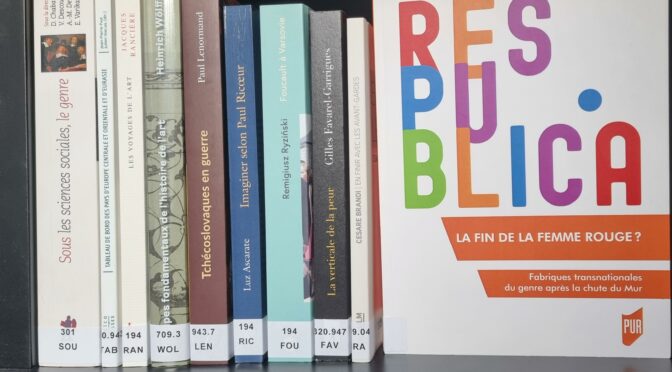
Konec roku oslavíme prezentací francouzských knižních novinek v humanitních a společenských vědách.
Sejdeme se v pátek 21. června 2024 v 15:00 v knihovně CEFRESu, Na Florenci 3, Praha 1
Mimo jiné budou představeny následující knihy:
- Luz Ascarate : Imaginer selon Paul Ricoeur. La phénoménologie à la rencontre de l’ontologie sociale (Paris : Hermann, 2022) představí Petr Horák
- Lise Foisneau : Kumpania. Vivre et résister en pays gadjo (Marseille : Wildproject, 2023) představí Yasar Abu Ghosh
- Baptiste Morizot : L’inexploré (Marseilles : Wildproject, 2023) představí Hana Fořtová
- Hyacinthe Ravet : Musiciennes. Enquête sur les femmes et la musique (Paris : Autrement, 2011) představí Louisa Martin-Chevalier
- Christelle Taraud (dir.) : Feminicides. Une histoire mondiale (Paris : La Découverte, 2022) představí Hélène Martinelli






